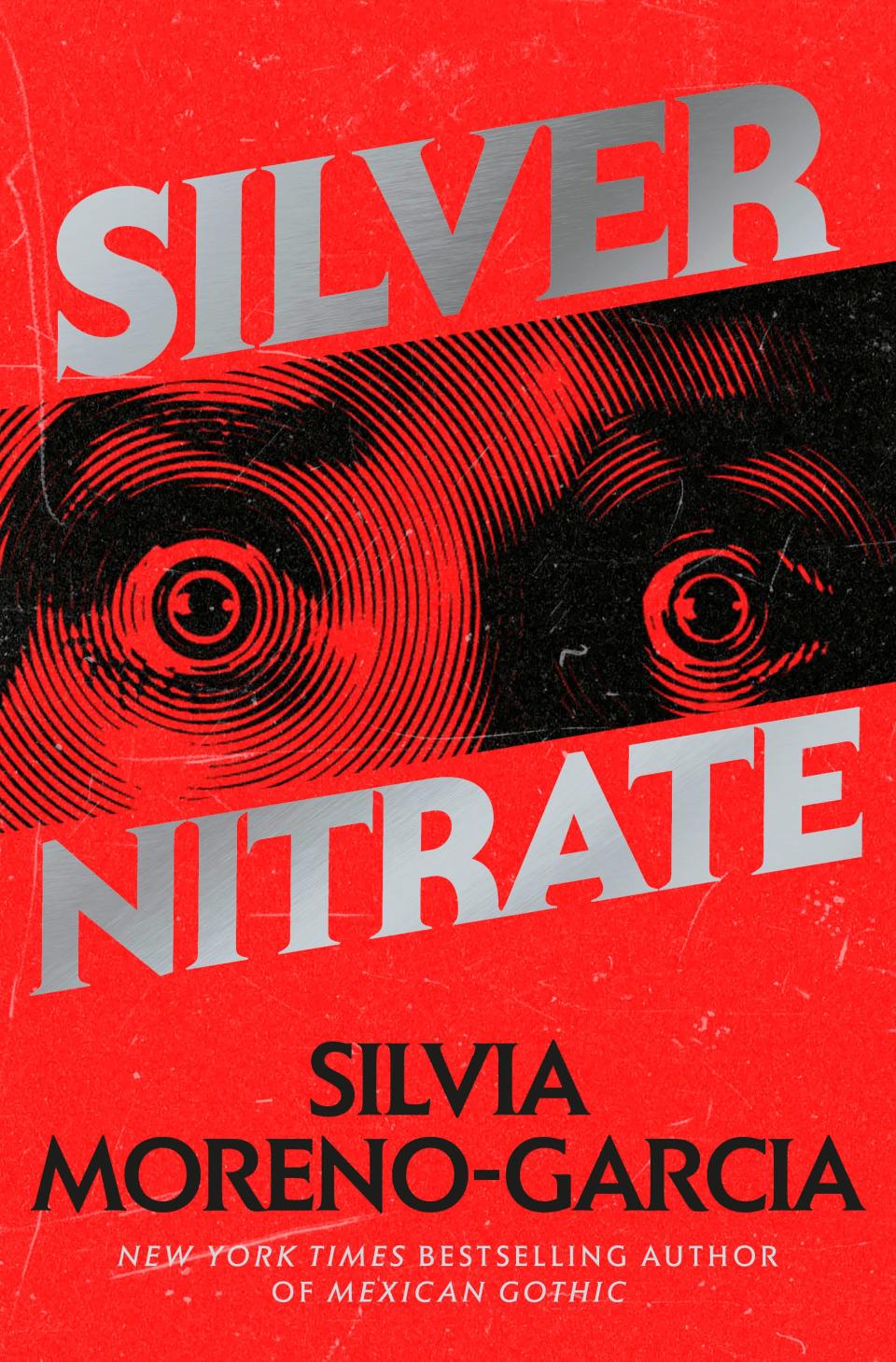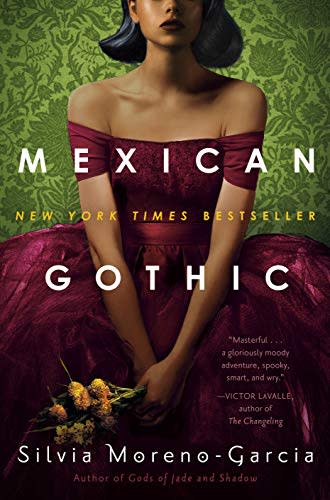'Silver Nitrate': Silvia Moreno-Garcia mixes Nazi occultism, Mexican horror cinema in new novel
Purchases you make through our links may earn us and our publishing partners a commission.
Silvia Moreno-Garcia, the bestselling author of the new horror novel "Silver Nitrate" (Del Rey. 336 pp., out now), thrives on pushing the limits and boundaries of genre.
"I'm not looking to exist in only one tiny corner of literature," the Mexican Canadian author says. "I want to explore the whole spectrum of literature."
That much is clear in "Silver Nitrate." Part gothic romance and part love letter to the thriving 90s Mexico City film industry, Moreno-Garcia's slow-burn thriller blends Mexican horror cinema with the horrors of Nazi occultism. "Silver Nitrate" follows two childhood best friends: passionate workaholic sound editor Monserrat and charming-but-washed-up soap opera actor Tristán. "They both loved movies," Moreno-Garcia writes. "But their similarities ended there."

Monsterrat has three loves, Moreno-Garcia writes, "One was horror movies. The other was her car. The third was Tristán." But Montserrat isn't taken seriously in a male-dominated film industry, and when it comes to Tristán, she's all but invisible. So when the pair of horror aficionados befriends the elderly, once-famous filmmaker Abel Urueta, their personal shortcomings make them more easily seduced by what he claims to promise: Urueta believes his final horror movie, shot in 1961, was cursed by Wilhelm Ewers, a Nazi occultist who swore silver nitrate film was "a perfect medium for sealing spells." By reshooting the final scene, Urueta believes the curse will be lifted and his luck returned.
Moreno-Garcia spoke to us about the occult, genre-hopping as a novelist, exploring social issues in her novels and how writing books is her definition "of fun and of existence."
How Nazi occultism inspired 'Silver Nitrate'
As a lover of film – "vintage film most of all" – Moreno-Garcia wanted to write a book related to sound editing set in 1990s Mexico, which marked an "important transition point," she says. "That’s when we start going from analog to digital."
The supernatural and occult also found their way to her. She was reading about early 20th-century occultism in Paris when she stumbled on a footnote about a German occultist who spent time in Mexico City. "I went down a rabbit hole, read his book on occult doctrine and it had racist stuff in there, then I started looking at other German and European occultism ... I just kept coming across racist stuff, it just kept popping up and up," she says. "I thought, well, that's interesting, let's do something with it."
"A lot of the people mentioned are real people and a lot of the things mentioned about occultism are either real things or things that are highly inspired by occultism," she says.
Silvia Moreno-Garcia isn't limited by genre

Is Moreno-Garcia a fantasy, romance, historical, crime, or horror writer? None of the above.
"Genre is something that is often understood taxonomically in the wrong way," she says. "You have to consider genre as something defined by context and by history. So, horror is something that cannot be defined simply by saying, 'It's scary.' You can't get to a true definition of horror like that."
When she looks back at 19th-century literature including Mary Shelley's "Frankenstein," Bram Stoker's "Dracula," Robert Louis Stevenson's "Strange Case of Dr. Jekyll and Mr. Hyde," then to the 20th century and Shirley Jackson's "The Haunting of the Hill House," she understands these works "sit more on a matrix, on a plane of existence rather than a simple word-association of horror."
She adds, "I look at it historically and contextually, and when you look at something (in that way), the borders of it become a lot more flexible and a lot more porous than when you are simply putting something on a shelf and it can only live on that shelf and it cannot touch anything else."
Genre shouldn't exist as a "series of silos," she explains, but rather on a "really big map to explore" all that literature has to offer. "I'm not looking for a reduction of spaces but an expansion."
'Are we monsters? Or are we miracles?': Silvia Moreno-Garcia's 'Doctor Moreau' reimagines a classic with a side of existential dread
Why Silvia Moreno-Garcia says she doesn't 'write for everybody'
Moreno-Garcia conjures stories about vampires, ancient Mayan gods, grifts and con artists, dark magic and animals turning into beastly caricatures of human beings.
She doesn't "just write one particular type of fiction" nor does she have one "prevailing aesthetic," she says. But she does "write for one particular reader. I actually don't write for everybody."
In "Silver Nitrate," she sprinkles references to the film industry and doesn't spend time spelling it out for readers. "I don't really care if people don't get the film references," she says. "You have to have a lot of understanding of the film industry (to see) how much these characters love it … ('Silver Nitrate') is not just a story about a supernatural element, it's also about the film industry in general and the passion that somebody can have for it."
At its heart, the book is also about "two people who are best friends and love each other," she adds. Taking the time to set this dynamic up and give readers context into why Tristán and Monsterrat are who they are was "crucial" for Moreno-Garcia. "That's what helps make it matter for the reader, but for the right reader."
Moreno-Garcia knows "there are certain people who are never going to like my books because they have too much history or they're set in Mexico and the names are weird and they can't pronounce it."
To that, she says: "There's a lot of other books in the world."
'All wrapped up in a mystery': Silvia Moreno-Garcia's must-read noir 'Velvet Was the Night' is hard to put down
Exploring racism and classism in 'Silver Nitrate,' other books
Moreno-Garcia's books also tackle themes of racism, classism, antisemitism and other social issues because "it's pretty hard to erase the reality of history," she says.
To write "Silver Nitrate," a book about occultism that touches on the magical practices of the early 20th century that she read about during the writing process, and "ignore the vein of racism and discrimination" that ran through those texts would be an injustice to her work.
Born in Baja California, Mexico, Moreno-Garcia's home country and its complicated politics also influence her writing. "It's the same thing with Mexican society," she explains. "If you’re doing anything that has to do with film and with entertainment, there is a caste system that manifests."
People who are of lighter skin land lead roles in soap operas or films, and those who are darker skinned, are subjected to stereotypical roles. "That's just a reflection of society at large," she says.
We're introduced to Tristán in "Silver Nitrate" as "tall and handsome," and Monsterrat, "on the other hand, was small and plain." One is a charming telenovela actor and the other is a hidden figure who has to work twice as hard to make her voice heard.
"(It shows) how Mexican society is colorist and classist and very much kind of a big social pyramid, so once you start looking at that – it's pretty hard not to," she says. "To have something that didn't mention that or reflect it in some way, I think that would be kind of a big lie."
The 12 scariest books we've ever read: 'Mexican Gothic,' Shirley Jackson, Stephen King and other ghastly frights
Writing books is all Silvia Moreno-Garcia wants to do

Moreno-Garcia, 42, has written over 70 short stories and penned nine novels to date. Since her 2015 debut "Signal to Noise," the author has been nonstop for eight years. Her juggernaut 2020 breakout hit, "Mexican Gothic," received critical acclaim and literary awards including the British Fantasy Award and Aurora Award for best novel. The book is being developed into a limited Hulu series with Kelly Ripa and Mark Consuelos' Milojo Productions. Before "Silver Nitrate" even hit shelves, she was already working on her tenth book.
"If I don't write, I don't eat," she says. "So I gotta eat, so I gotta write something."
Her upcoming historical novel "The Seventh Veil of Salome" will be released in 2024 and is set in 1950s Hollywood.
More than her bread and butter, writing is "the most important thing in the universe."
She paraphrases a quote by the late Pulitzer Prize-winning author Cormac McCarthy: "He said he didn't understand people who wanted to go on vacation because he just wanted to sit in front of a typewriter with a blank page and type. That for him, was golden. It's the same for me." The author of "The Road" and "No Country for Old Men" died at 89 on June 13, a few days before our Zoom interview.
"I just want to be in front of a computer writing," Moreno-Garcia says. "To me, that's the definition of fun and of existence. I don't want to do anything else in life."
"Silver Nitrate" at Amazon for $14"Silver Nitrate" at Bookshop for $26
'Poetry offers us a powerful space': Janel Pineda, Clint Smith, on magic of poetry
This article originally appeared on USA TODAY: Silvia Moreno-Garcia interview: Nazi occultism in 'Silver Nitrate'

